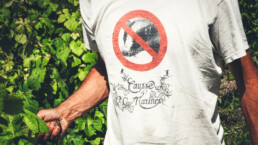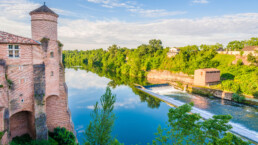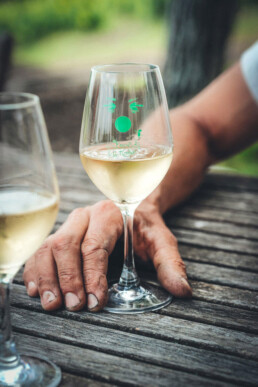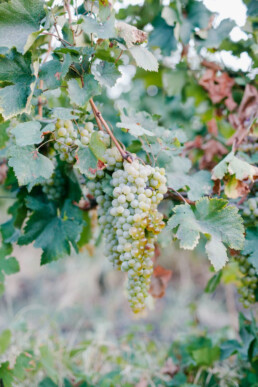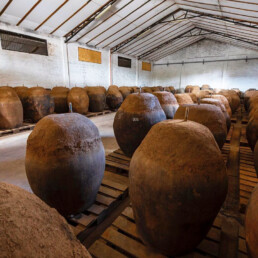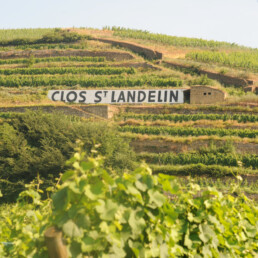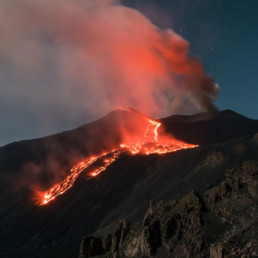There are those who accept the status quo and there are those who challenge it. Time to meet a challenger ‘exceptionnel’ – our Dhall & Nash Wondermaker Patrice Lescarret of Causse Marines. He’s a rule-breaker who is driving progress in one of France’s most under-appreciated wine regions, Galliac. Here we have a rebel winemaker ripping up the rule book to do things differently, yet nonetheless, very deliciously!
“No one invented wine!
Humility forces us to constantly question our beliefs.
Observe, feel, even imagine (if not understand).
Respect our Earth, its fertility, its balances, its breathing.
Generate simplicity.
Support your identity, without artifice.
Without dogma or fundamentalism,
Causse Marines is proud to cultivate its garden, in all conscience”
– From the Causse Marines website
Progress is often made when order is disrupted. And non-conformist Patrice Lescarret has pushed the bureaucratic and oenological boundaries, to craft exhilarating wines sought after by the equally rebellious avant-garde of the wine world. If you look at wine lists from any of the coolest top wine bars of the world you will no doubt, find the wines of Causse Marines.
They are instantly recognisable by the humorous wine labels with their irreverent, but obscure, jibes at French bureaucracy! However, the cheeky labels belie the serious winemaker behind them who is committed to restoring the Gaillac region to its former glory.
“This estate affirms its convictions through firm, straight and very personal wines.” – La revue du Vin de France
A Bit on Gaillac:
Gaillac, inexplicably, is a virtually unknown region – its name given to both the wine appellation and the town. In France’s Southwest, it’s about 50km northeast of Toulouse, on the Tarn river. When the river reaches Gaillac, the hills open up and the river becomes navigable – all the way, via the Garonne, to the Atlantic.
Believe it or not, Gaillac wine was one of the first ‘Grands Crus’ of ancient Roman Gaul. As quality wine, it was a millennium ahead of Burgundy and 1500 years ahead of much of Bordeaux. Since the 17th Century this region’s wines and individuality have sadly faded into obscurity.
Today, with winemakers like Lescarret, the top drops of Gaillac deserve to be better known. The best quality of Gaillac may not be comparable to the heights of Bordeaux, Burgundy, or Rhône, but it is regions like this hidden gem that create the interest, richness and depth that makes the world of wine so endlessly appealing.
“It is in the whites that the subtlety, delicacy and grace of Gaillac is most clearly on view.” – Andrew Jefford, Wine Writer, Decanter Magazine
The "Enfant Terrible":
Patrice Lescarret studied at the Bordeaux Oenology Institute, and he jokes that after learning the ‘wrong way around’ at the wine school and being paid for a few years to apply this conventional winemaking in other wineries in Provence and Sancerre, he now happily tries to vinify the ‘right way around’.
Fed up with conventional winemaking, he made the big leap in 1993 to create his own domain, Causse Marines. He bought 8 hectares of vineyards near the tiny village of Vieille just outside Gaillac, from a retiring farmer who had been selling his grapes to the local co-op. Since then, the estate has been extended to encompass 12 hectares of regenerated heritage vines.
“We can make organic wine without having long hair and smoking grass! One can make natural wines that don’t smell like a cow’s fart.” – Patrice Lecarret, Winemaker/Owner
From 2005 Virginie Maignien was Patrice’s fellow winemaker, muse, and partner. Originally, Virginie studied at the ESSEC business school but quit everything to enroll in a wine school in Burgundy. Having met Patrice whilst on a brief training stint at his vineyard, she worked and never left his side until she started her own wine venture in 2019 in the Languedoc-Roussillon region. Today Patrice strides onwards with his mission to make great Gaillac wines.
His Unique Terroir, His Unconventional Ways:
Contrary to all sorts of wild suppositions, the name Causse Marines is simply derived from the domain’s geography: ‘Causse’ after the rocky plateau of limestone and calcareous soil on which the vines grow, and ‘Marines’, the name of the river that flows by the estate.
The vineyard is Demeter certified Biodynamic, so they are tended with no pesticides, herbicides, or fungicides or artificial fertilizers. Fining and filtration are kept to a minimum, and only a small level of sulphites is used. The grapes are all harvested by hand to ensure only the finest are used. They follow all the planetary ‘rhythms’ and viticultural ‘rituals’ of Biodynamics, but ultimately, his philosophy is simple: look after the land and let the wines make themselves.
“It is enough to respect the grape and the vinification is finished. The winegrower should only be in the cellar to accompany his grapes and finalize, without oenological inputs, the fruit of his peasant labour. Let the ground and the life express itself and a difficult art!” – From the Causse Marines website
The vineyards at Causses Marines have very old vines dating back to World War Two. Patrice Lescarret wanted to magnify the potential of this unique terroir by celebrating the indigenous and obscure grape varieties like Len de L’el (Loin-de-l’Oeil), Ondenc, Muscadelle, Petit Manseng, Verdanel, Braucol, Duras, Mauzac, Prunelart, Mas de Daumas, Jurançon, Alicante Bouchet and any more.
When he first started with the original 8 hectares of vineyards, about 1 hectare was planted with hybrid vines, which Lescarret uprooted before planting more indigenous varieties like Muscadelle and Len de L’el. But there was no Ondenc for example, which had almost disappeared from the region. Due to being low yielding, prone to disease (Oïdium) and no-one could get subsidies from the state for planting it, growers mostly ripped it out. Not Lescarret – he tracked some down thanks to local vine crusader and vintner, Bernard Plageoles. Today on the 12-hectare domain there are 13 different varieties, some with weird names most wine amateurs have never heard about. Much is owed to these two pioneers. And heartfelt thanks to this rebel with a cause!
“The only law in Causse Marines is that of the vine and the wine.” – From the Causse Marines website
As a true independent spirit, and with his vision to restore viticultural integrity, it was a point of pride and a big part of Lescarret’s vineyard philosophy, that there were to be no clones in the vineyard. Everything is propagated by Selection Massale, and Patrice chooses and grafts the vines himself.
Just briefly – what is Massal Selection (MS)? Selection Massale is a French wine growing term for the practice of replanting new vineyards with cuttings from exceptional old vines from the same (or nearby) property. Massal Selection was considered the “old way” of propagating vineyards that has since been replaced with vine clone nurseries. These nurseries obtain the wood for the vines from ‘mother gardens’ planted with certified clones of individual varieties, which are then grafted on to suitable rootstock. This clonal replacement is what Patrice abhors!
Thankfully, times are changing. Now, it is widely considered better for the dead or under-performing vines to be replaced with new vines grown from cuttings (MS) from many of the best older vines in the same vineyard, because it maintains both the vineyard’s health and diversity, but just as importantly, it means no loss of ancient indigenous varieties. This was just the starting point for Lescarret’s ongoing battle with bureaucracy…
Lescarret, like many other excellent producers have ending up joining the Vin de France (VdeF) category (the old Vin de Table) as they rebel against strict appellation rules. Conflicts with appellation regulators and overly controlling regulations can cause wines to drop out of the appellation system – only to be labelled as VdeF. The most common reason for leaving the appellation system is to use varieties that aren’t permitted. Also, to use Insufficient sulphur. Mon Dieu!
“There’s no intervention here, except a very little sulphur” is how Patrice describes his winemaking.
Thus, the Vin de France category has become a means of protecting disappearing indigenous varieties that aren’t allowed in the AOP. The Appellation authorities in Gaillac seem especially determined to stamp out individuality among their producers yet have no clear idea of what Gaillac should represent.
Still not content, Lescarret bemoans the lack of confidence, individuality, and oenological education amongst many local growers, who he sees as happy to accept the status quo rather than pushing for a more ambitious quality embracing the local varieties. Slowly but surely, the Galliac region which had largely fallen behind over the years because of ill-conceived choices of the Appellation bodies and because of standardized winemaking, is now starting to make its comeback in the wine scene with thanks largely to winemaker rebels like Patrice.
“Lescarret’s wines prove that excellent and highly individual wines can be achieved with this chalky terroir and will hopefully act as a beacon to his peers.” – Tim Atkin MW
Wines Without Artifice:
Unique in their own right, what Causse Marines has is this amazing repertoire of old-vine, own-rooted vineyards that unveil themselves as beguiling wines that are picked at lower Brix (sugar/potential alcohol) and with gentler handling to achieve supple texture, fruit purity and crunchier acidity. That sounds like a bit of us alright! Time to try:
Causse Marines Gaillac ‘Les Greilles’:
Les Greilles is a cool, yet classy, white wine blend of Mauzac (50%), Loin de l’Oeil (20%), old vine Muscadelle (20%), Chenin (10%) and Semillon.
The grapes come from a number of low-yielding parcels in their stunning vineyards with the maximum yield being a low 35 hectolitres per hectare. The low yield leads to increased fruit intensity that distinctively shines through in this wine.
The vinification is done by direct pressing, slow fermentation in vats, indigenous yeasts, no fining, a light filtration, and a zest of sulphur. In short, the natural extension of a Lescarret’s culture of respect for the environment. It is without artifice or window dressing. This is result of his quest for raw uncluttered purity – exulted!
The wine presents floral and exotic fruit notes, the nose is delicate, the mouth full, rich, and marked by freshness. The whole keeps a nice tone and a fair balance.
To the Dhall & Nash tasting team, this is an engaging wine of great complexity and with nuances that make it a perfect wine to match with a wide range of foods. It is undoubtedly a perfect aperitif wine as well as being an ideal accompaniment for charcuterie, hearty seafood, and even can handle spiced Asian and Indian foods.
Causse Marines Gaillac ‘Peyrouzelles’:
Peyrouzelles is a red wine blended mainly from Braucol, Duras and Syrah but Patrice Lescarret also says that this wine has a “bit of everything” (un peu de tout) including the rare Alicante (a grape with very dark red flesh), the very rare Prunelart (also a dark-coloured grape) and Jurancon Noir!
The wine is big, dark, and brooding but also, surprisingly, comes across the palate as light and elegant. It is a wine that marries well with lots of dishes without overpowering them. It is an easy-drinking style that is perfect now, but which will keep for another year or two as the tannins soften.
“The important thing is not to know if this vintage is good or not, but rather to realize if this juice suits your taste buds (or not).” – Patrice Lescarret, Winemaker/Owner
Causse Marines is Patrice Lescarret – the winemaker, the rebel, the thinker, the idealist, and the keeper of an invaluable viticultural heritage. He is a man of no compromises – he produces wines naturally and of the highest standards. Just like the man himself, his wines have authentic, strong personalities with a clear expression of place and purpose. Salut Patrice!
